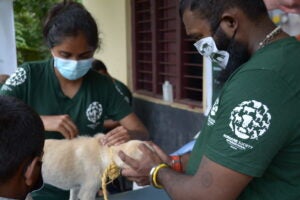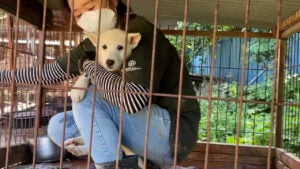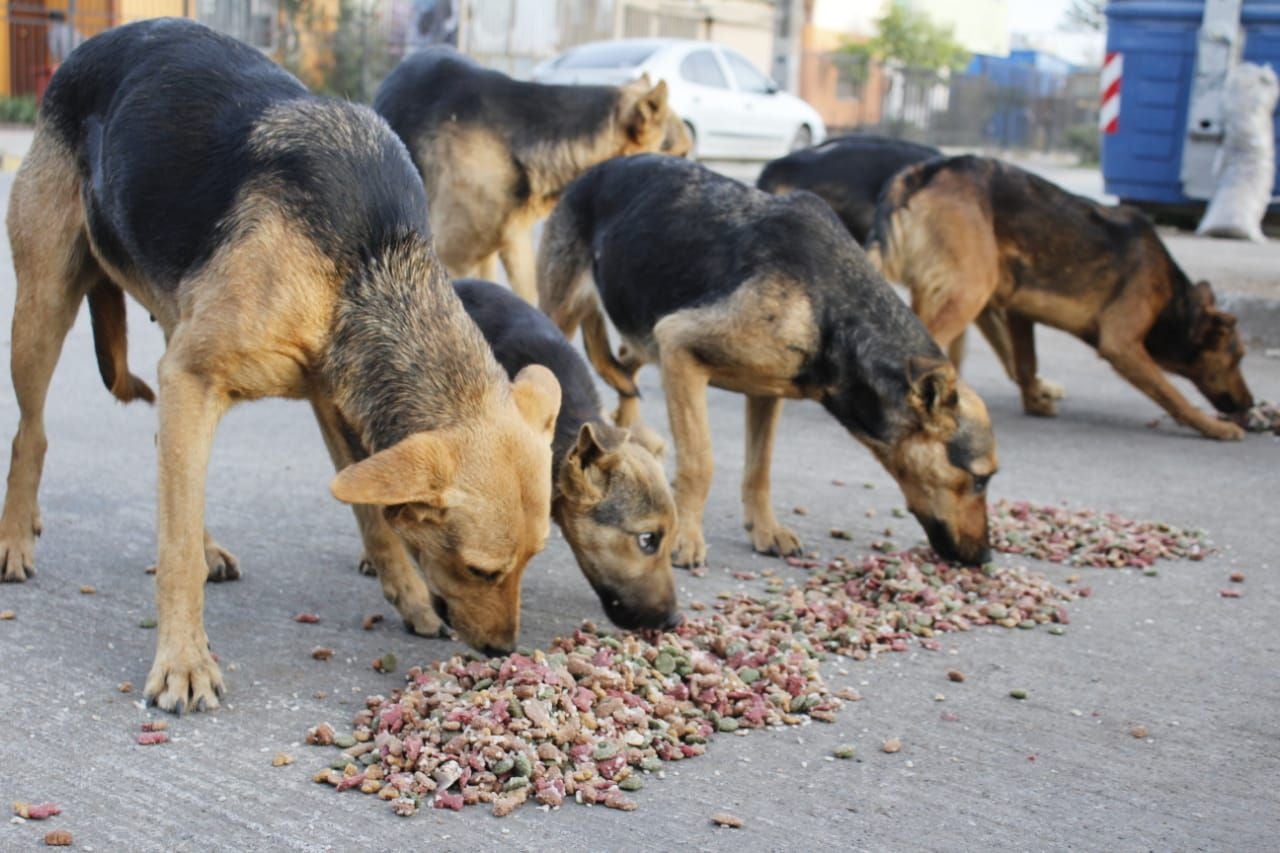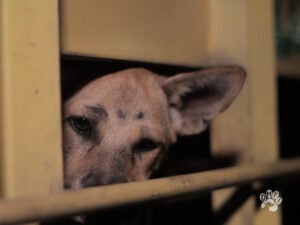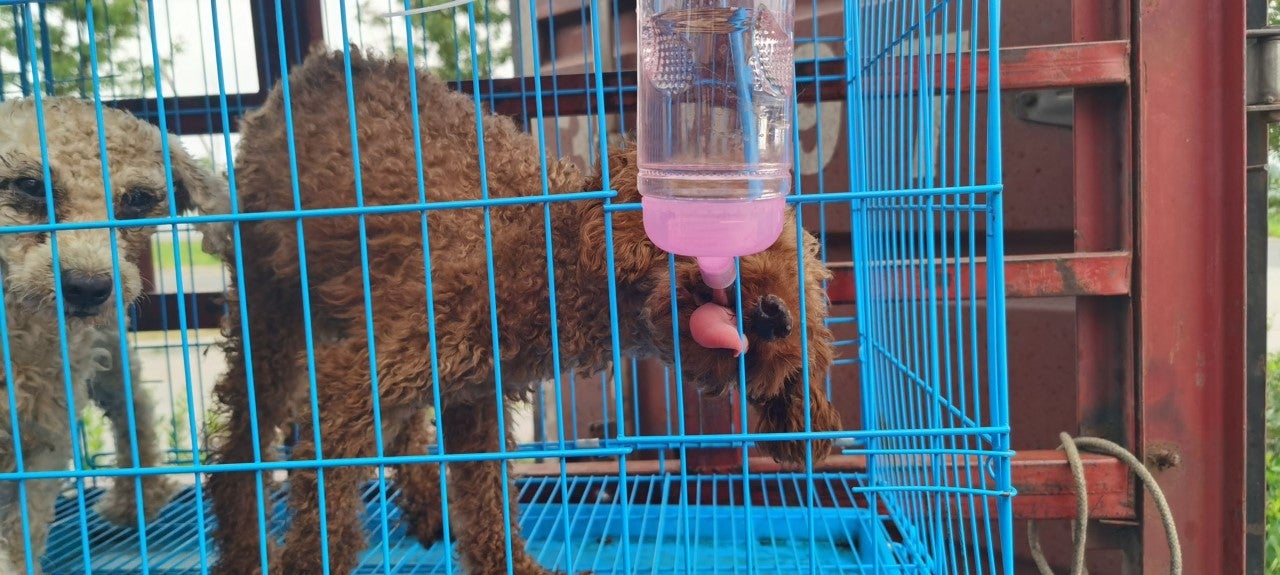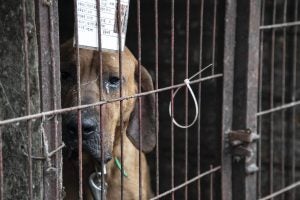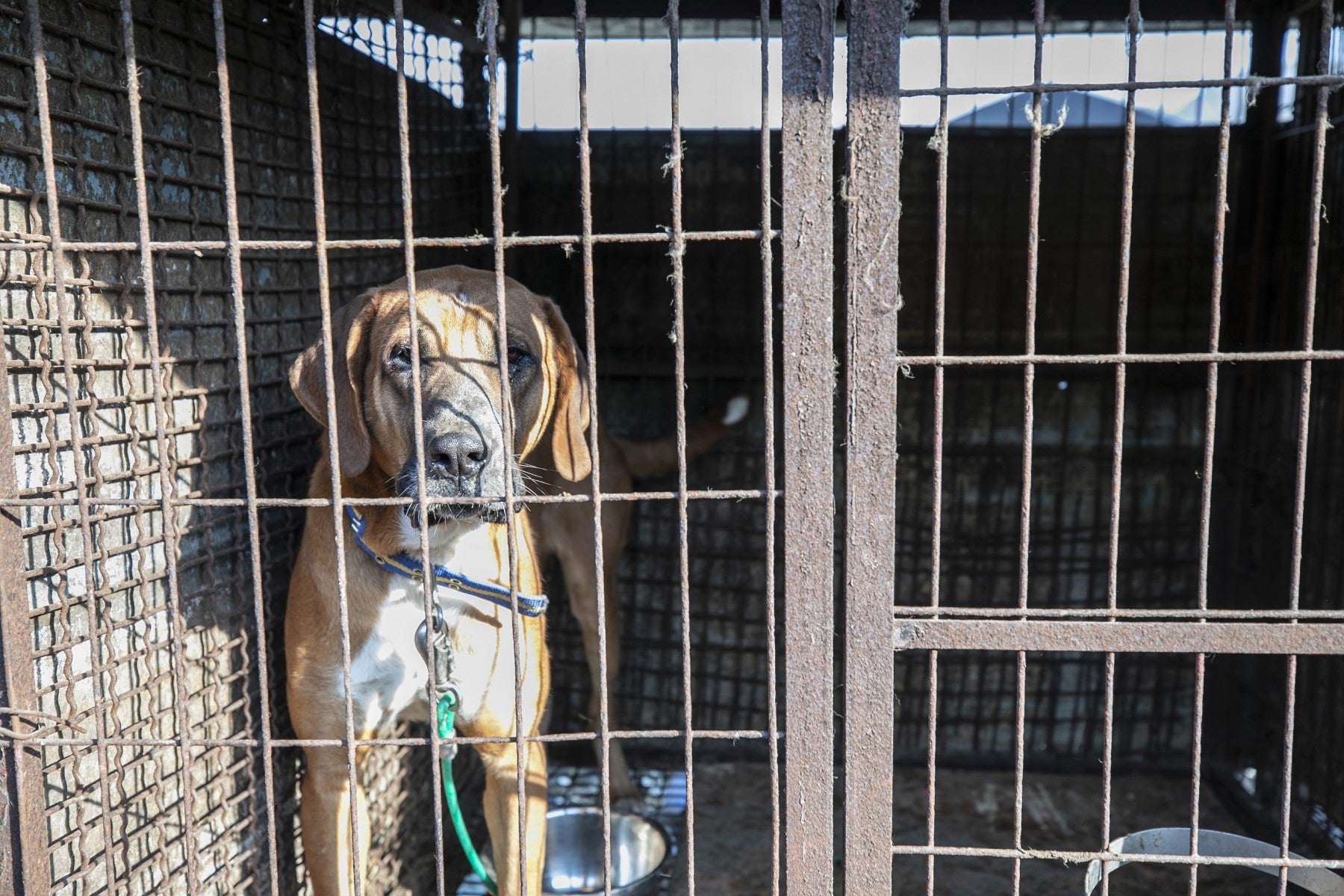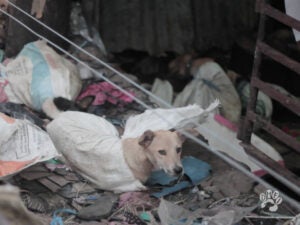
Kulon Progo, INDONESIA—A dog meat trader in Indonesia has been found guilty of breaking the law and sentenced to a 10 month jail term and $USD10,000 fine (150 million IDR) in the country’s first ever dog meat prosecution. The trader was caught by Kulon Progo District Police in May this year, transporting 78 dogs in the back of a truck. Only 62 dogs survived the ordeal. The dogs were trafficked from Garut in West Java, via Kulon Progo and headed for slaughter for human consumption throughout Central Java. The interception comes after years of campaigning by the Dog Meat Free Indonesia coalition, of which Humane Society International is a founding member. The coalition hopes this prosecution will send a strong signal to traders across Indonesia that the dog meat business is illegal and will be punished. DMFI is pushing for an explicit nationwide ban on the brutal trade.
The dogs in this case had all been stolen from the streets where pet dogs freely roam. Many were still wearing collars whilst bound on the truck to be transported on a gruelling journey lasting more than 10 hours. The trader was found guilty of violating Article 89 paragraph 2 in conjunction with Article 46 paragraph 5 of Law N0. 41 of 2014, concerning Animal Husbandry and Health because the truck illegally crossed provincial borders, with no record of the animals’ disease or vaccination status.
The Dog Meat Free Indonesia coalition has conducted numerous investigations since 2016, exposing the brutal reality of the trade in dogs destined for human consumption. Every month, tens of thousands of these dogs are taken from the streets and illegally transported in many parts of Indonesia. Many die during this horrific journey from heatstroke, dehydration or injuries inflicted during capture and transport. Those who survive are taken to slaughterhouses where they are beaten and strung upside down to bleed out while still conscious or beaten to death in public markets in some parts of the country, in full view of other terrified dogs who await their turn.
Bali-based Lola Webber, who is End Dog Meat campaign director for DMFI member group Humane Society International, welcomed the news: “This verdict sends a strong message to dog meat traders that this brutal trade is illegal and won’t be tolerated in Indonesia. Ultimately we want to see an enforced nationwide ban on Indonesia’s dog meat trade, but in the meantime this prosecution will also hopefully encourage the authorities in other provinces to use existing laws at their disposal to crack down on dog meat traders who continue to operate in their jurisdictions. There is no excuse for tolerating this illegal cruelty or the dangers the trade pose to public health and safety.
As well as being unspeakably brutal, it’s easy to see how this trade is the perfect breeding ground for the next serious public health disaster. Dogs are routinely slaughtered in public alongside all manner of wild and domestic species in markets in North Sulawesi. New pathogens could easily jump to humans if a dog trader was wounded during the day’s slaughter, a local consumer ate cross-contaminated dog meat bought at a nearby stall, or a tourist breathed in microscopic blood droplets as they sight-see the markets. In the face of such an obvious public health and animal welfare risk, we hope this will be the first of many prosecutions. We cannot allow the dog meat trade to thrive across Asia if we hope to protect the public from future pandemics.”
Dog meat trade facts:
- Opinion polls show that only a small minority of Indonesia’s population (4.5%) consume dog meat and only a very small number of those involved in the trade consider dog meat to be their main source of income.
- Rabies is a grave concern in Indonesia, with just eight out of 34 provinces declared rabies-free. Cities in Central Java such as Surakarta (“Solo”) where > 13,700 dogs are slaughtered and sold in dozens of local restaurants each month, are jeopardising their rabies-free status by allowing dogs of unknown disease and vaccination status to be imported from surrounding provinces to supply dog meat, despite opinion polls showing just 3% of Central Javans consume it.
- The illegal movement of large numbers of dogs of unknown disease status into densely populated areas contravenes rabies control recommendations by leading human and animal health experts including the World Health Organization, the Pan American Health Organization, and the Food and Agriculture Organization of the United Nations as well as national disease prevention legislation.
- There are widely publicised reports directly linking the dog meat trade to rabies transmission in many parts of Asia where the dog meat trade operates, including Indonesia. Scientific reports have documented rabies-positive dogs being sold and slaughtered in markets in Indonesia, as well as in restaurants and slaughterhouses in China and Viet Nam.
- Dog theft for the meat trade is a serious problem in Indonesia. Dog Meat Free Indonesia has interviewed many residents who have described their terrifying ordeal with armed traders stealing their pets at night. Despite the obvious law-breaking, thefts are rarely taken seriously by law enforcement, so the thieves go unpunished.
- Across Asia, opposition to the dog and cat meat trades is increasing, with an ever-growing number of countries and territories (Taiwan, Hong Kong, the Philippines, Thailand and two major cities in mainland China) banning the trade in and slaughter, sale and consumption of dogs; and in Indonesia, regencies and cities such as Karanganyar, Salatiga and Sukoharjo have already passed explicit bans in their jurisdictions amidst concerns for animal welfare and public health and safety.
- The Dog Meat Free Indonesia campaign has received support from global and Indonesian superstars including a letter to President Joko Widodo in 2018 calling for action to end the country’s dog and cat meat trades signed by Simon Cowell, Sophia Latjuba, Yeslin Wang, Nadia Mulya, Lawrence Enzela, Cameron Diaz, Chelsea Islan, Ellen DeGeneres and Pierce Brosnan.
Download Video of Solo Investigations
Download Photos of Solo Investigations
ENDS
Media Contacts:
- Lola Webber, Humane Society International, Dog Meat Free Indonesia international coordinator: +6281337408768; Lwebber@hsi.org
- Karin Franken, national coordinator Dog Meat Free Indonesia Coalition: +628212287794; jaan_adopt@yahoo.com

